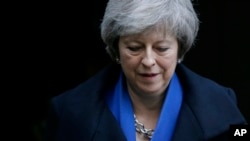Britain is studying how its roads and shipping could be affected if the country leaves the European Union (EU) without an agreement between the two sides.
The study, which began Monday, is meant to show possible traffic problems if the country leaves the EU on March 29. That is when a new British law is set to go into effect. It would require Britain to cancel its EU membership, even if the government is not finished negotiating an exit agreement.
Prime Minister Theresa May is attempting to win parliamentary approval of an EU exit agreement to avoid the automatic exit. But British lawmakers are expected to reject the deal. A vote on the measure is set for next week.
Almost 100 trucks took part in the first day of testing. The trucks traveled about 30 kilometers from a closed airport to the port of Dover, in southeastern England.
May’s government has repeatedly warned that an automatic exit from the EU, without an agreement, would cause severe economic problems. It is widely believed that a “no-deal” exit would lead to new taxes and customs barriers in Britain. This would likely slow Britain’s transportation links to the rest of Europe.
Transportation experts have predicted major traffic problems leading into and out of ports like Dover. Such problems could also lead to shortages of food and medicine.
Some British lawmakers have criticized the tests as a waste of time and money. Britain’s Road Haulage Association has described the tests as “too little, too late”. The group suggested holding additional transport exercises that are much bigger.
Charlie Elphicke is a Conservative Party lawmaker from Dover. He told the Reuters news agency that he believes any tests need to be much larger to effectively measure possible effects on transportation.
“Less than a hundred lorries is a drop in the ocean compared to the more than 10,000 that go to the channel ports every day,” he said.
Supporters of Britain’s exit from the EU have admitted the split would lead to some economic disruption in the beginning. But they believe that such effects would only be short term. In the long run, they expect Britain to gain new economic and political strength outside of the EU.
Groups opposed to Britain’s withdrawal say it will isolate the country too much from Europe and will hurt the economy.
I’m Caty Weaver.
Bryan Lynn wrote this story for VOA Learning English, based on reports from the Associated Press, Reuters and VOA News. George Grow was the editor.
We want to hear from you. Write to us in the Comments section, and visit our Facebook page.
_______________________________________________________________
Words in This Story
automatic – adj. working by itself or with little human control
lorry – n. large road vehicle for transporting goods
disruption – n. interference into or stopping something
isolate – v. separate someone or something from other people or things






